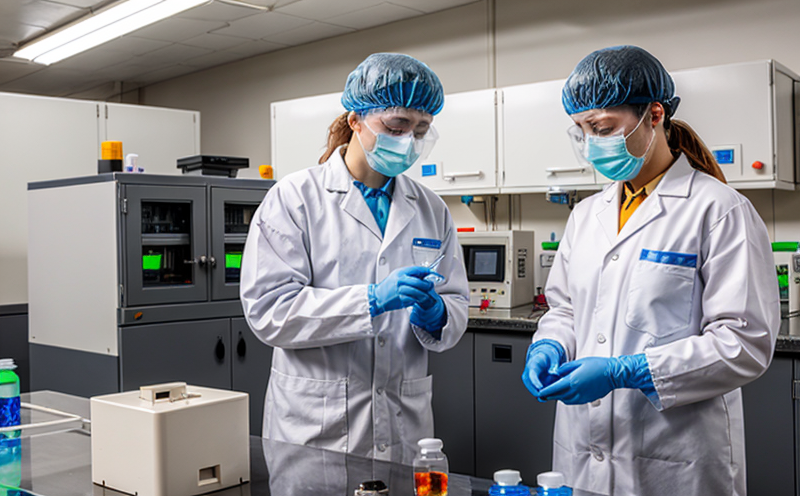ISO 74126 PAH Detection in Barbecue Foods
The International Organization for Standardization (ISO) standard ISO 74126 provides a comprehensive framework for the detection and quantification of polycyclic aromatic hydrocarbons (PAHs) in barbecue foods. This standard is particularly important given the potential health risks associated with PAH exposure, especially from grilled or barbecued meats.
PAHs are formed during the incomplete combustion of organic materials, including wood, coal, and petroleum products used as fuel for grilling. These compounds can adhere to food surfaces and pose a risk when consumed in excess. ISO 74126 addresses this by outlining precise methodologies for sampling, sample preparation, instrumental analysis, and reporting results.
The standard applies to various types of barbecue foods but focuses on those prepared using direct heat sources like charcoal or wood. It is especially relevant for meats such as chicken, pork, beef, and lamb, which are commonly consumed in the form of grilled or barbecued dishes. The standard ensures that food processors and suppliers can demonstrate compliance with regulatory limits set by authorities.
The testing process involves several critical steps: initial sampling, where a representative portion of the food is taken from different parts of the batch; sample preparation, which may include extraction techniques to release PAHs for analysis; instrumental analysis using gas chromatography-mass spectrometry (GC-MS) or high-performance liquid chromatography (HPLC); and finally, the interpretation of results against specified limits.
Compliance with ISO 74126 is crucial not only to ensure product safety but also to maintain consumer trust. The standard helps businesses meet regulatory requirements set by organizations like the U.S. Food and Drug Administration (FDA) or European Union regulations, which often reference ISO standards for harmonization.
For those in the food processing industry, adhering to this standard can provide a competitive edge. It not only ensures that products are safe but also aligns with global trends towards safer eating habits and healthier lifestyles. By reducing PAH content, companies can differentiate their products in crowded markets, attracting health-conscious consumers.
Additionally, ISO 74126 supports ongoing research into the effects of PAH exposure on human health. The standard provides a consistent method for measuring these compounds, enabling scientists and researchers to gather reliable data over time. This information is vital for public health officials who must make informed decisions regarding dietary guidelines and safety measures.
The implementation of ISO 74126 also benefits quality managers and compliance officers by providing clear, standardized protocols that simplify the regulatory compliance process. These professionals can use the standard as a roadmap to ensure their operations meet international standards without unnecessary complexity or ambiguity.
In conclusion, adherence to ISO 74126 is essential for any business involved in barbecue food production. By following this rigorous testing protocol, companies not only protect public health but also enhance their reputation and marketability. This standard represents a commitment to quality and safety that resonates with consumers worldwide.
Industry Applications
| Application | Description |
|---|---|
| Grilled Meat Testing | This application focuses on testing meats like chicken, pork, and beef that are prepared using direct heat sources such as charcoal or wood. The standard ensures the detection of PAHs to ensure food safety. |
| Pork Products | The ISO 74126 standard is applicable to pork products grilled over wood or charcoal, providing a means for accurate PAH quantification. |
| Chicken and Other Bird Meats | This includes testing chicken and other bird meats that are typically barbecued or grilled. The standard helps in identifying any potential PAH contamination. |
| Lamb Preparations | The testing of lamb, especially when prepared by grilling or barbecuing, is crucial for ensuring compliance with safety standards. |
| Processed Meats | This covers the analysis of processed meats that might be subjected to barbecuing or grilling. The standard ensures that these products are safe for consumption. |
International Acceptance and Recognition
The ISO 74126 standard has gained widespread acceptance across many countries, particularly in regions where barbecue culture is prevalent. Compliance with this standard is often a prerequisite for entry into international markets.
In the United States, several states have adopted regulations that align closely with ISO standards to ensure food safety. Similarly, European Union member states frequently reference these international standards in their own directives and legislation.
The recognition of ISO 74126 extends beyond national borders; it is also endorsed by various global health organizations such as the World Health Organization (WHO). This endorsement adds credibility to the standard and reinforces its importance in food safety practices worldwide.
Adherence to this standard not only facilitates trade but also enhances consumer confidence. By ensuring that barbecue foods meet stringent quality and safety criteria, businesses can build trust with their customers, which is essential for long-term success.
Competitive Advantage and Market Impact
In today’s competitive food market, compliance with ISO standards like 74126 can provide significant advantages. Consumers are increasingly demanding safer, healthier products, and businesses that meet these expectations can gain a strong foothold in the market.
By implementing ISO 74126, companies demonstrate their commitment to food safety and quality, which can translate into better brand reputation and customer loyalty. This standard also helps differentiate offerings in crowded markets, allowing brands to stand out as leaders in food safety practices.
The use of this standard can reduce the risk of recalls or legal issues associated with contaminated products. Proactively addressing potential health risks through rigorous testing protocols not only mitigates these risks but also positions a company as a responsible and forward-thinking entity.
In conclusion, ISO 74126 PAH detection in barbecue foods is more than just a compliance measure; it is an investment in long-term success. By adhering to this standard, companies can ensure product safety, enhance brand reputation, and achieve sustainable growth in the competitive global food market.





